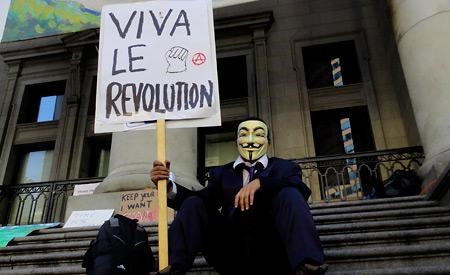by Kyle Wells [email protected] A handful of Powell River residents travelled to Vancouver on Saturday, October 15 to take part in the Occupy Vancouver protest and express their discontent with a variety of issues related to governance and global finance.
The CBC reported that 4,000 gathered outside Vancouver Art Gallery Saturday and about 400 remained there Sunday. Protests started in 15 Canadian cities all on the same weekend, including Victoria where protestors gathered in Centennial Square.
The Occupy Wall Street movement started on September 17 when an estimated 1,000 protestors marched in New York and a few hundred started camping overnight in a park in the area. Since then protestors have remained in the park and continue to march. Over 700 people have been arrested in the New York protests and protests have now been held in 70 cities in the United States.
Claudia Medina, a local filmmaker, was among those from Powell River who joined the protest in Vancouver.
The movement in New York has been criticized by some for a lack of leadership or a singular message to convey. Medina sees the very lack of leadership or a single demand as the very point of the movement and a move away from that kind of mindset.
“The idea of there being one monolithic answer, one monolithic response or system to replace this one that is broken is just as problematic,” said Medina. “There’s actually many answers, there’s many different approaches and they are happening already, they’re just happening from the ground up, as opposed to from the top down.”
To protest in Vancouver means to show that the issues being brought up by the Occupy Wall Street protests are not localized to that one location, said Medina. She sees this as a far more widespread issue and one that is at play in Canada as well as the United States. The globalization of the economy means that everyone is affected by a financial system that is not working, said Medina.
“I think right now more and more people are feeling the impacts of such a fragile and very precariously balanced economy,” said Medina. “The goal is really that, to be able to come together and say despite the differences in how this is impacting everybody there is this collective desire to confront it, and to confront it in a positive way.”
Medina also sees the concerns of rural communities as having a place in the protest. She believes that rural economies often feel the booms and busts of the modern financial system more than cities. A city like Powell River is especially vulnerable, said Medina, as the industries and resources upon which it relies are subject to the whims of the global market and control of international corporations.
“The benefits of those resources are reaching fewer people and so the people who are managing to reap the benefits are a smaller and smaller, concentrated group,” said Medina. “And they’re making the rules.”
The future of the protest is uncertain to Medina but while she sees the actual occupying of space coming to an end eventually she believes that the issues and ideas raised by the protest will continue to influence political and public discourse.



